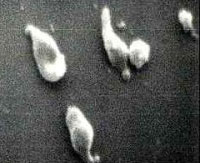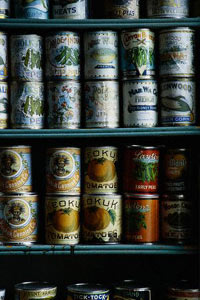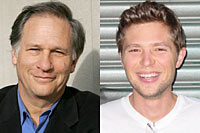
On this page, you'll find regularly updated audio, video, and text reports from our producers and correspondents. We invite you to join the discussion about topics covered here on our board and to subscribe to our audio and video podcasts to download these reports to your computer or MP3 player.

Mycoplasma genitalium, the humble life-form that calls the human genital tract home and could one day soon be the first synthetic creature. 
A DNA store? Krulwich and Lehrer have learned that everything's for sale, even genes. You can buy the ingredients of a gene for about $4,000, and discount rates are on the horizon! |
7.7.2005 Keep It Very SimpleJonah Lehrer: Last week, I told you about scientists who re-created a virus from fragments of its DNA. You pointed out that viruses aren't quite living things—they're almost alive—so therefore, science has yet to really create life from dead stuff. Robert Krulwich: I keep you honest. Lehrer: But now I've got something new for you. The same team of scientists that made the fake virus has set out to deconstruct a real living thing. Even you would call this thing living. Krulwich: What does that mean, "deconstruct a real living thing?" Did they take something apart? Lehrer: Well, their method is called the keep-it-very-simple, or top-down, method. Basically, they want to figure out the minimal ingredients necessary for life. Once they know that, they will then try to build their own living things. Krulwich: Now this is where I start shaking my head. You can't see my head, but it's shaking, like, "no way..." Lehrer: Why? Krulwich: Because the idea that you can boil down any living thing to a short list of simple ingredients, The 12 Essential Chemicals, or somesuch, with nothing added... Lehrer: No lightning? Krulwich: Right, no lightning...no mysterious fire...that seems presumptuous to me. Lehrer: But these folks are doing science; they're not doing Zeus. They have a method. So you should let me— Krulwich: All right, all right. Tell me their "method." Lehrer: Well, they begin with an itty-bitty thing, the simplest possible form of life. Krulwich: Is this it? This little, uh...What is it anyway? Lehrer: This is Mycoplasma genitalium, a bacterium that lives in our genital tract. Krulwich: I'm afraid to ask: where is our genital tract? Lehrer: Don't ask. Krulwich: Okay, so, uh, what do they do with this thing? Lehrer: Very slowly, they take it apart. Krulwich: Apart? Lehrer: Yup. This organism is made of 512 different genes. To figure out what makes it living, scientists knock out one gene at a time. After each gene is knocked out, a single question is asked: is the organism still alive? If the answer is yes, another gene is removed. And then another. Hopefully, at the end of the experiment, what will be left is— Krulwich: One really furious bacterium? Lehrer: No, what's left is the minimum set of genes required for life. Which means— Krulwich: Wait, I still don't see how this, as you put it, "discovers the essence of life." All it will really show is how sick you can make a simple organism without killing it. It's like taking a human being and slowly removing one organ at a time. And, if we happen to die when you take our liver away, that doesn't mean that our liver is "the essential" reason we are alive. Livers are nice, but life is more than liver. What about a heart? A brain? Come on— Lehrer: Why don't you let me fin— Krulwich: I'm just pointing out that this experiment won't find the essence of— Lehrer: Couldn't I finish? Krulwich: Sure. Go crazy. See if you can find the "essence" of— Lehrer: All these top-down scientists want to do is figure out if itty-bitty life-forms have some parts they don't need. In other words, how simple can the simplest of life-forms get? Does this bacterium have the equivalent of an appendix or a pinky toe, stuff you don't really need? If so, let's take it out. And when you've taken all the unnecessary parts out, you will be left with the shortest possible recipe for life. Krulwich: And? Lehrer: And, Dr. Hamilton Smith, who by the way, already has a Nobel Prize and Craig Venter (one of the leaders in the race to discover the human genome) say that after testing every gene, they have determined at least 215 of the bacterium's 517 genes are not absolutely necessary. Krulwich: Really? The itty-bittiest little thing doesn't need half its genes? Lehrer: Yup. They've taken an itty-bitty thing and shown that they can make an itty-itty-itty-itty-bitty thing. Krulwich: Now that's what I call progress. Lehrer: Well, it is progress. Krulwich: So what happens next? Lehrer: Next, Dr. Smith and his team, now that they have a short list of essential genes, they will go shopping at the DNA store—there are companies that sell those A's, C's, G's, and T's you learned about in high school that make up a string of DNA... Krulwich: DNA stores? I had no idea— Lehrer: Yup, you can buy the ingredients of a gene for about $4,000 or more, but prices have been dropping... Krulwich: And then they're going to put the A's, C's, T's, and G's in the proper order and...? Lehrer: And, says Dr. Smith, about two years from now, they think they will have a self-generated, brand new, synthetic Mycoplasma genitalium! Life! Krulwich: The real thing? Lehrer: The real thing. Or, if you want to get all technical, what they will have is a synthetic copy that does everything the real thing does. That's the hope. Krulwich: Well, let me have one last quibble. Lehrer: What? Krulwich: Even if they can make their own copy of this little bug, I still don't think it solves the question of life. It seems to me like cheating to take a known life-form and slowly deconstruct it. When life began over a billion years ago, there was nothing on Earth but a big soup of warm chemicals. Until science shows how water, fire, and dust can come together to make life, I still don't think we'll know what the essence of life is.
Lehrer: Fair enough. Stay tuned, and next week I'll tell you about how some
scientists starting with nothing but a vast vat of dead molecules are actually
watching life begin. In the meantime, reader, send me your thoughts on our discussion
board. We want to hear from you.
|
|||||||||||

Robert Krulwich is host and executive editor of NOVA scienceNOW. Jonah Lehrer is a NOVA scienceNOW online contributing editor. He recently completed a Rhodes scholarship at Oxford University's Wolfson College. |
||||||||||||
|
© | Created July 2005 |
||||||||||||